#RPA in Healthcare
Explore tagged Tumblr posts
Photo
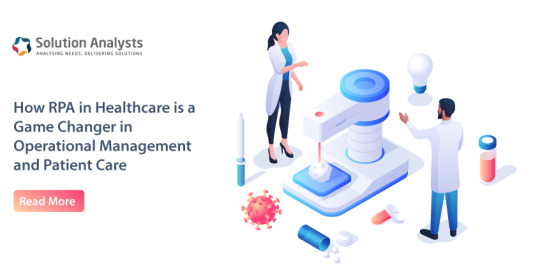
This is where RPA in healthcare industry comes in as it automates certain processes which ensures that healthcare professionals can focus on patient care rather than other tedious tasks. Solution Analysts offers Robotic Process Automation services which help businesses adopt a process automation strategy to fulfil long-term goals.
#RPA in Healthcare#RPA in healthcare industry#Robotic Process Automation in healthcare#Benefits of RPA in Healthcare
2 notes
·
View notes
Text
RPA in Healthcare: Enhancing Accuracy, Speed, and Patient Outcomes

Learn how RPA is empowering healthcare institutions to achieve higher accuracy in data management, faster processing of patient information, and better overall outcomes. See why RPA is becoming a critical tool in the healthcare industry.
0 notes
Text
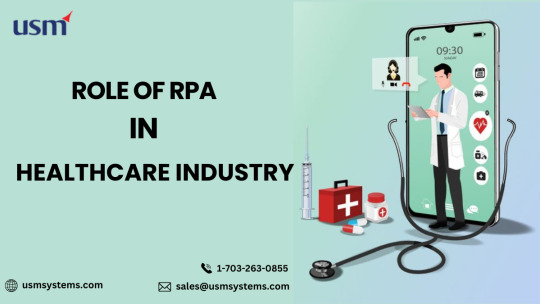
Role Of RPA In Healthcare Industry
Robotic Process Automation (RPA) is transforming the healthcare industry by automating repetitive tasks like patient data entry, billing, and appointment scheduling. It improves accuracy, enhances productivity, and reduces operational costs. RPA's use cases include insurance claims processing, inventory management, and real-time patient monitoring. Its benefits include faster workflows, reduced errors, and better patient care.
For robust RPA healthcare solutions, USM Business Systems is the leading mobile app development company.
USM Business Systems
Services:
Mobile app development
Artificial Intelligence
Machine Learning
Android app development
RPA
Big data
HR Management
Workforce Management
IoT
IOS App Development
Cloud Migration
#RPA in healthcare#Healthcare automation apps#Benefits of RPA apps#Healthcare automation tools#Robotic process automation benefits#RPA use cases in healthcare#RPA healthcare applications#RPA for patient care#Automation in medical billing
0 notes
Text
Transforming Healthcare Operations with RPA
Robotic Process Automation (RPA) in healthcare is revolutionizing the industry by automating administrative tasks, allowing healthcare professionals to focus more on patient care. The technology enhances data accuracy, speeds up administrative processes, and reduces human error. By integrating RPA, healthcare institutions can streamline billing, patient scheduling, and data management. This not only improves operational performance, but also contributes to better patient outcomes. Implementing RPA is an essential step towards modernizing healthcare and ensuring that the service providers can meet the growing demands of this dynamic industry.
0 notes
Text
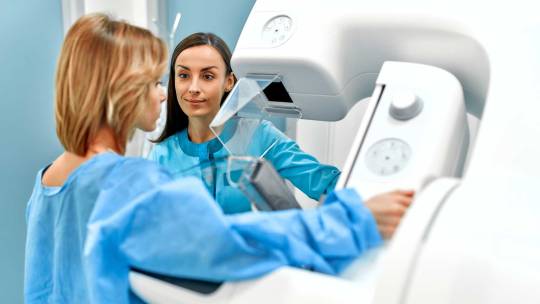
Cancer Care Follow-up automation developed by a Finnish company improves patient safety and aims to save hundreds of millions of euros
#intelligent automation#robotic process automation#intelligent automation in healthcare#rpa in healthcare
0 notes
Text
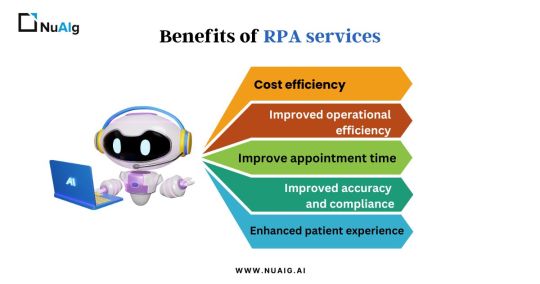
#rpa#robotic process automation#rpa services#rpa consultant#rpa in healthcare#rpa for healthcare#rpa consulting#rpa service company
0 notes
Text
0 notes
Text
Unlocking Efficiency and Innovation: The Role of Robotic Process Automation (RPA)
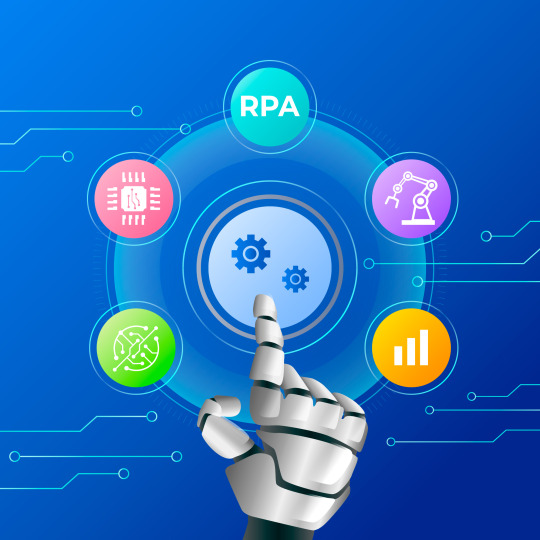
In today's fast-paced and competitive business environment, organizations are constantly seeking ways to improve efficiency, reduce costs, and increase productivity. Robotic Process Automation (RPA) has emerged as a powerful tool that can help businesses achieve these objectives.
What is Robotic Process Automation (RPA)?
Robotic Process Automation (RPA) is a technology that allows businesses to automate repetitive, rule-based tasks. It uses software robots, also known as "bots," to mimic human actions and interact with digital systems. These bots can log into applications, navigate through screens, input data, and complete tasks just like humans would.
The Role of RPA in Business:
RPA can be used to automate a wide range of tasks across various industries and departments. Here are some examples:
Finance and Accounting: Automating tasks such as accounts payable and receivable, invoice processing, and financial reporting.
Customer Service: Automating tasks such as answering FAQs, resolving customer inquiries, and processing orders.
Human Resources: Automating tasks such as onboarding new employees, processing payroll, and managing benefits.
IT: Automating tasks such as provisioning accounts, managing user access, and deploying software updates.
Impact of RPA on Businesses:
Implementing RPA can offer numerous benefits to businesses, including:
Increased efficiency and productivity: RPA can automate time-consuming and tedious tasks, freeing up employees to focus on more strategic and value-added activities.
Reduced costs: RPA can help businesses save money on labor costs, as well as reduce errors and compliance risks.
Improved accuracy and compliance: RPA bots are programmed to follow specific rules and procedures, which can help to improve accuracy and compliance with regulations.
Enhanced process visibility and control: RPA provides businesses with a clear view of their processes, which can help them identify and address bottlenecks.
Improved customer satisfaction: RPA can help businesses improve customer satisfaction by automating tasks such as order processing and customer service interactions.
RPA Services:
Implementing RPA successfully requires a partner with expertise in the technology and a deep understanding of business processes. A comprehensive RPA solution should include the following services:
Document AS-IS Process: This involves mapping out the existing process to identify areas for automation.
Design & Development of Bots, workflows, and forms for process automation: This includes designing and developing the software robots that will automate the tasks.
Bot license (We will use the appropriate underlying technology): This provides access to the software robots and the underlying technology platform.
Infrastructure: This includes setting up the necessary infrastructure to support the Robotic Process Automation (RPA) solution.
Production Deployment of the Bots: This involves deploying the bots to production and monitoring their performance.
RPA support: This includes ongoing support for the RPA solution, such as troubleshooting and maintenance.
Test & Deploy bots to production: This involves testing the bots in a production environment and making any necessary adjustments before they are deployed to full production.
Configuration data changes: This involves making changes to the configuration data of the bots as needed.
Password updates: This involves updating the passwords of the bots as needed.
Errors in executing the Bots: This involves resolving errors that occur during the execution of the bots.
Determining the “root cause” of a recurring issue or incident & recommendations: This involves identifying the root cause of a recurring issue or incident and recommending solutions to prevent it from happening again.
Infrastructure/application related issues: This involves resolving issues with the infrastructure or applications that the bots are interacting with.
Conclusion:
RPA is a powerful technology that can have a significant impact on businesses of all sizes. By automating repetitive tasks, RPA can help businesses improve efficiency, reduce costs, and increase productivity. However, it is important to choose a reputable Robotic Process Automation (RPA) companies with the expertise and experience to help you implement a successful RPA solution.
Ready to embrace the power of RPA?
Contact us today to learn more about how RPA can help your business achieve its goals.
#robotic process automation#robotic process automation rpa#rpa automation#robotic process automation software#rpa software#robotic process automation companies#robotic process automation technology#robotic process automation in healthcare#robotic process automation in banking#rpa solution#robotic process automation for finance#process automation solution#robotic process automation services#robotic process automation for insurance#rpa system#what is rpa automation#robotic process automation solution#robotic process automation benefits#robotic process automation consulting#robotic process automation consultant#rpa service provider#rpa consulting services
2 notes
·
View notes
Text
The role of RPA in healthcare is becoming increasingly imperative as healthcare providers search to improve efficiency, reduce costs, and enhance patient care. Advancements in technology are driving a revolution in the healthcare sector that aims to improve patient satisfaction, lower costs, and increase performance. RPA (Robotic Process Automation) is one of the innovative technologies driving the future era of healthcare revolution. In recent times, the AI role has significantly increased, which enables RPA automation of time-consuming and repetitive work-related tasks, including medical billing, claims processing, and patient data entry.
#health care#medical coding services#healthcare#health and wellness#medicalcare#medical coding#medical health care#rpainhealthcare#rpa
0 notes
Link
Discover how Robotic Process Automation is transforming healthcare with smarter, faster solutions. Want to know more?
Read the full blog: https://bit.ly/4dUBXvM
#roboticprocessautomation#rpa#healthcare#healthcaretransformation#efficiency#costsavings#patientcare#datamanagement#compliance#scalability#healthcareinnovation#automation
0 notes
Text
Boost Patient Care with Automated Insurance Eligibility Verification

Delivering top-notch patient care requires more than just medical expertise. Administrative processes, such as insurance eligibility verification, can be time-consuming and error-prone, taking valuable resources away from patient care. But fear not! There's a game-changing solution on the horizon - Automated Insurance Eligibility Verification. Looking for Partners who can help you Automate your Insurance Eligibility verification? Contact Droidal. We use RPA bots to automate such tedious processes.
What You Get When You Work With Droidal
Streamlining the Process with RPA
Imagine a world where insurance eligibility verification is swift, accurate, and effortless. With Automated Insurance Eligibility Verification, this dream becomes a reality. By harnessing advanced technology and smart algorithms, RPA bots automate the verification process, eliminating the need for manual paperwork and time-consuming phone calls.
Efficiency Meets Accuracy
Human errors in insurance eligibility verification can lead to costly claim denials and delays, impacting both your bottom line and patient satisfaction. Automated systems, however, ensure a higher level of accuracy and consistency. Data is rapidly analyzed and cross-referenced against insurance provider databases, generating real-time and reliable results.
Security and Compliance
Protecting patient data is paramount in the healthcare industry. As a Leading Automated Insurance Eligibility Verification company, we prioritize data security and comply with strict regulations, including HIPAA. You can rest assured that patient information remains confidential and protected against unauthorized access.
Improved Patient Experience
Patients seek seamless experiences in healthcare, and eligibility verification can often be a bottleneck in providing efficient care. By automating this process with RPA, your team can focus on patient needs, offering enhanced care and support. A streamlined patient journey results in higher satisfaction and increased patient loyalty.
In a world where time is of the essence and efficiency is paramount, Automated Insurance Eligibility Verification is a game-changer for healthcare providers. Say goodbye to paperwork headaches and embrace a new era of streamlined efficiency. Improve your revenue cycle, enhance patient satisfaction, and boost your practice's reputation with Droidal. Contact us today to learn more and embark on a journey of increased efficiency and improved patient care.
1 note
·
View note
Text
KMG and Socotra Partner to Drive Innovation and Efficiency in the Insurance Industry
Key Management Group (KMG), a niche IT professional services provider, has announced a strategic alliance with Socotra product implementation, a leading provider of the insurance industry's most connected core platform. This partnership aims to assist insurance companies in embracing innovation and adapting to the rapidly evolving industry landscape by leveraging cutting-edge technologies and tailored solutions.
KMG specializes in delivering digital transformation services to the insurance sector, empowering clients to optimize their business processes, enhance customer experiences, and improve operational efficiency. With a comprehensive suite of services, including consulting, automation, custom development, digital integrations, and product implementation, KMG equips its clients with the necessary tools to navigate the complexities of the digital world.
Socotra stands out among insurance software providers, offering an open, cloud-native, and API-first Connected Core platform. Its platform is further strengthened by the Socotra App MarketPlace, which enables insurers to seamlessly connect to a wide range of applications and data sources, ultimately improving every aspect of the insurance value chain.
The partnership between KMG and Socotra combines KMG's deep industry expertise with Socotra product implementation. This collaboration empowers insurers to harness the power of digital innovation, providing a seamless and engaging customer journey while streamlining operations and reducing costs.
Ravendra Singh, EVP & Insurance Practice Head of KMG, expressed excitement about the partnership, stating, "We are thrilled to partner with Socotra product implementation, a true pioneer in the insurance software industry. By combining our expertise in digital transformation with Socotra's next-generation platform, we will be able to deliver groundbreaking solutions that enable our clients to stay ahead of the curve in a rapidly changing insurance landscape."
Michael Benayoun, Director of Partnership at Socotra, added, "We are delighted to be partnering with KMG. Their extensive experience in the insurance industry and commitment to innovation make them the ideal partner for Socotra. Together, we will help insurers accelerate their digital transformation journey while delivering unparalleled value to our joint customers."
With a shared vision of redefining the insurance industry, KMG and Socotra are poised to become significant players in the market. Their collaborative efforts will bring innovative and transformative solutions that drive growth, increase efficiency, and deliver exceptional customer experiences.
About KMG: KMG is a leading provider of IT professional services, specializing in digital transformation for the insurance industry. Through its comprehensive suite of consulting, development, and implementation services, KMG helps insurance companies optimize their business processes, improve customer experiences, and enhance operational efficiency. For more information, visit www.kmgus.com.
About Socotra: Socotra provides a modern core platform for integration solutions in the insurance industry, offering unparalleled speed, agility, and efficiency to carriers, insurers, and MGAs. The platform is renowned for its advanced cloud-native technology and standardized, public, open APIs that enable clients to innovate quickly and remain competitive in a rapidly changing market. Socotra's platform is enhanced by the Socotra App MarketPlace, which provides instant integration to a growing community of data and service providers.
0 notes
Text

The Role of Robotic process Automation in Healthcare
RPA plays a transformative role in healthcare as it enables automation processes, streamlines administrative tasks, improves patient care, and reduces operational costs. It automates the repetitive entry of data, scheduling appointments, billing, and other activities, thereby allowing the healthcare professionals to be more engaged with patients. Data is also accurate and adheres to compliance, which is critical in healthcare. USM Business Systems stands out as a top mobile app development company for firms looking to implement RPA within their programs.
USM BUSINESS SYSTEMS
Services:
Mobile app development
Artificial Intelligence
Machine Learning
Android app development
RPA
Big data
HR Management
Workforce Management
IoT
IOS App Development
Cloud Migration
#RPA in healthcare#robotic process automation#healthcare automation#improve patient care#automate administrative tasks#healthcare efficiency#data accuracy in healthcare
0 notes
Text
Robotic Process Automation in the Healthcare Industry
The healthcare industry is constantly evolving, and RPA is the latest innovation that can help healthcare providers improve patient care, reduce costs, and increase efficiency. SVAM’s RPA services can help you automate tedious and time-consuming tasks, such as data entry, patient information storage, and scheduling. With RPA, you can focus on core business processes while leaving the repetitive tasks.
Visit:
0 notes
Text

Cancer Care Follow-Up: Empowering Clinical Excellence With Intelligent Automation - Case story from a prominent Nordic Hospital discussing Automation in Follow-Up Care
0 notes
Text
Robotic Process Automation In Healthcare | RPA Consulting Services | NuAIg NuAig is the best RPA consulting service provider that delivers bespoke robotic process automation solutions in the healthcare and senior living industry. They have a team of experts who implement RPA automation for aged care providers and healthcare firms. Check out the RPA use cases to know more about process automation using robotics technology. To book a demo mail at [email protected] call +1 732 328 8205
#robotic process automation in healthcare#robotic process automation#rpa automation#digital process automation#rpa solutions#robotic process automation services#rpa in healthcare#rpa consulting#rpa implementation#rpa use cases#robotic process automation solutions#rpa consulting services#rpa service provider#rpa advisors for senior living#rpa application for senior living#rpa for caregiver onboarding#rpa services for senior living
0 notes